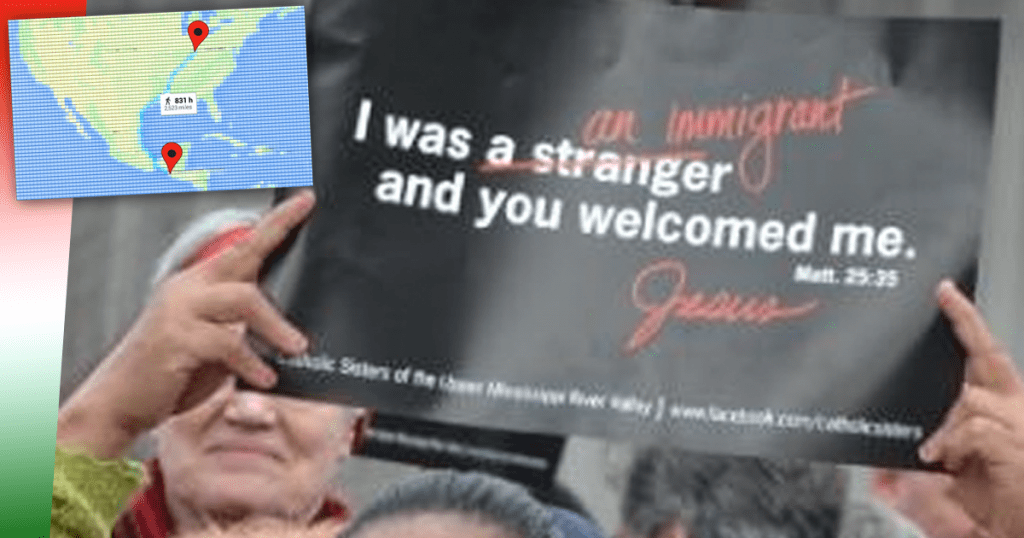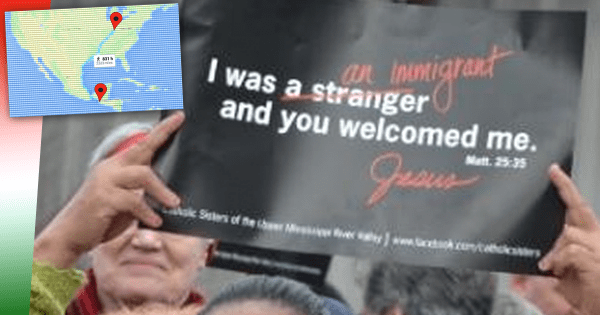Immigration reform: Personal Perspectives Part 2

The following is the second of a two-post series on personal perspectives on Immigration Reform (to read Part 1, click here). We begin with a video in which Sr. Mary McCauley (an advocate for comprehensive immigration reform) talks about the Postville immigration raid, and follow with Sr. Tracy Kemme’s deeply personal encounter in Guatemala with the mother of one of her parishioners from Holy Family Parish in Cincinnati, OH.
Sister Mary McCauley talks about Postville immigration raid:
Sister Tracy Kemme writes:
I noticed an older woman in her traditional garb approaching us. She greeted each one with a smile and press of the hand. I was grateful for her welcome. I never expected the words that came out of her mouth next.
“Do you know Ever?”
My heart stopped for a second. “Ever Reynoso?” I asked.
“¡Sí!” Her eyes were shining now.
“Yes, I know him,” I replied, fixated on her face and its beautiful brown wrinkles. “He is a member of our parish. I’m Sister Tracy, and I minister with the Latino group. How do you know him?”
We embraced immediately. I called over a few other travelers from our group who know Ever and his wife, Margarita, and their seven children. We hugged his mom tightly and told her how wonderful he is. Of course, she already knew.
“He is such a good person, my son,” she began, as water appeared in the creases at the corners of her eyes. “I haven’t seen him for 12 years, since he left for the U.S.”
At that, she shook her head from side to side, in pain and perhaps disbelief. Then, she lowered her face and covered her eyes with both hands as the tears came. We extended our arms to her, and she melted into our hugs.
Ever and Margarita left Guatemala when they were a young couple with two small children, a boy and a girl. They both hold teaching degrees in Guatemala, but they could not find steady jobs that would sustain their growing family. As so many of our Guatemalan parishioners have told me, “Simplemente, no hay trabajo.” Simply, there’s no work.
Ever came first to the United States, and Margarita followed a few years later, almost getting lost in Mexico on the treacherous journey. Since coming, they’ve had five more children. Two years ago, they brought their oldest two children, now junior high age, to be with them in the U.S. In all this time, they haven’t been able to go home. If they did, they wouldn’t be able to get back in. And their life is here now. Five of their children are U.S. citizens, and several of them are on the autism spectrum. They know staying is the only chance for a good life for them.
I often hear about the pain of family separation from people like Ever and Margarita in my community here. Now, I have also touched the pain felt by those left behind.
Sister Tracy and Father Len with Matilde, Ever’s mom. Photo from Global Sisters Report website.
For 12 years, Ever’s mother, Matilde, has not laid eyes on her son, and unless something finally changes with our immigration system, she may never see him again. She has never met her five U.S.-citizen grandchildren. The technology isn’t sufficient yet in Concepción for them to video chat. She is grateful that she can hear Ever’s voice every few weeks on the phone. But, she said, laying her weathered hands on my shoulders and peering into my eyes, “It is not the same as seeing someone in front of you, hugging them, feeling them.”
Mixed emotions washed over me. I felt joy and wonder at having made this connection. Stronger, still, I felt deep sadness and guilt. How wrong that I could travel freely to stand here with Ever’s mother when he cannot.
The story is all too common, and it repeated itself numerous times during our four-day stay in Concepción…In the congregation at Mass and in our visits to schools, we met parents, children, cousins, aunts and uncles, grandparents, nieces and nephews, and friends of our beloved Guatemalan parishioners.
The second reading for the day happened to be Galatians 3: 26-29. A portion of it reads: Brothers and sisters: Through faith you are all children of God in Christ Jesus. . . . There is neither Jew nor Greek, there is neither slave nor free person, there is not male and female; for you are all one in Christ Jesus. Fr. Guadalupe posited that we could add to the passage from Galatians, “There is no American or Guatemalan. There is no English-speaker or Mam-speaker. There is no immigrant or citizen. We are all one in Christ Jesus. We belong to Christ and one another.”
As we said good-bye to Matilde on our last day in Concepción, she handed us some gifts to take to her son, Ever, and his family. In one bag was her fresh baked bread, which Ever had not enjoyed in 12 long years. When he tasted the bread this week, he must have tasted true Eucharist. Thousands of miles and unjust immigration policies divide families. But our faith says that we are one in Christ Jesus.
In honor of Matilde, Ever, and so many other loved ones, I pray to work to make that oneness more a reality. I invite you to do the same.
Source: Global Sisters Report, We are one body: Separated by unjust immigration policies; united in Christ, by Sr. Tracy Kemme
For more resources on Immigration click here.








0 Comments